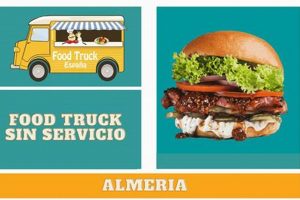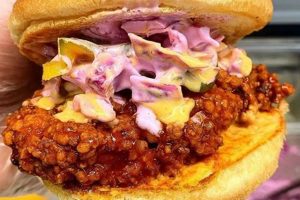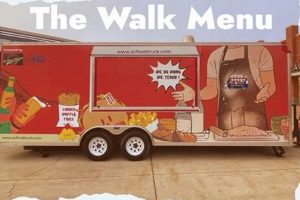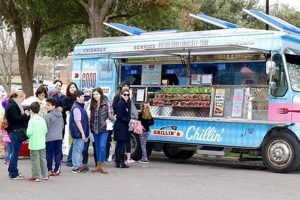Mobile culinary businesses specializing in smoked and grilled meats have become increasingly prevalent. These establishments offer a diverse range of regionally inspired barbecue styles, providing consumers with convenient access to traditional slow-cooked fare. Examples include operations that feature Texas-style brisket, Carolina pulled pork, or Memphis-style ribs, all prepared and served from a mobile platform.
The rise in popularity of these mobile kitchens is attributable to several factors. They offer entrepreneurs a lower barrier to entry compared to brick-and-mortar restaurants, enabling quicker market penetration and reduced overhead. Furthermore, the adaptability of these businesses allows them to cater to diverse events and locations, increasing brand visibility and revenue streams. Historically, mobile food vending has provided an accessible pathway for culinary innovation and entrepreneurship.
Subsequent sections will delve into operational considerations for launching such a business, including equipment selection, menu development, and navigating regulatory compliance. An examination of successful business models and strategies for building a loyal customer base will also be provided. Finally, future trends and potential challenges within the sector will be discussed.
Operational Strategies for Barbecue Food Trucks
The following guidelines offer actionable strategies for optimizing the operations and enhancing the profitability of a barbecue food truck business.
Tip 1: Strategic Location Selection: Analyze demographic data and event schedules to identify high-traffic areas with minimal competition. Proximity to office complexes during lunch hours and attendance at local festivals can significantly impact sales volume.
Tip 2: Menu Optimization for Efficiency: Streamline the menu to focus on items that can be prepared and served quickly without compromising quality. Pre-portioning ingredients and utilizing efficient cooking techniques are essential.
Tip 3: Implement Robust Inventory Management: Employ a system for tracking inventory levels and predicting demand to minimize waste and prevent stockouts. Accurate record-keeping of perishable goods is crucial for food safety and cost control.
Tip 4: Prioritize Equipment Maintenance: Establish a routine maintenance schedule for all cooking and refrigeration equipment. Regular servicing reduces the risk of breakdowns, preventing costly disruptions to operations.
Tip 5: Develop a Comprehensive Marketing Plan: Utilize social media platforms, local partnerships, and targeted advertising to build brand awareness and attract new customers. Offering loyalty programs can encourage repeat business.
Tip 6: Ensure Compliance with Regulations: Maintain strict adherence to all local health codes and regulations regarding food handling, preparation, and storage. Regular inspections and employee training are vital.
Tip 7: Focus on Exceptional Customer Service: Train staff to provide friendly, efficient service and address customer inquiries promptly. Positive word-of-mouth referrals can significantly contribute to business growth.
Effective implementation of these strategies will contribute to improved operational efficiency, increased profitability, and enhanced customer satisfaction.
The subsequent section will explore emerging trends and innovations that are shaping the future of the mobile barbecue industry.
1. Regional Style Variations
The success of mobile barbecue enterprises is intrinsically linked to the authenticity and execution of regional barbecue styles. The geographic diversity of barbecue traditions in the United States, for example, necessitates a nuanced understanding of regional preferences. Operations choosing to specialize in Texas barbecue must accurately replicate the dry-rubbed, slow-smoked brisket characteristic of that region. Conversely, those offering Carolina-style barbecue should adhere to the preparation methods and sauce profiles specific to either the Eastern (vinegar-based) or Western (tomato-based) variations. Misrepresentation or improper execution can result in negative customer perception and reputational damage. A thorough understanding of regional nuances is therefore crucial for menu development and overall brand credibility. For instance, a truck specializing in Memphis-style ribs must offer both “wet” (sauced) and “dry” (rubbed) options to cater to local expectations.
The incorporation of regional styles also extends to equipment selection and sourcing. Texas barbecue, with its emphasis on brisket, requires large-capacity smokers capable of maintaining consistent temperatures for extended periods. In contrast, Carolina-style whole hog preparation might necessitate specialized cookers and pit designs. The sourcing of ingredients is equally critical. Authentic Texas barbecue relies on specific cuts of beef, while Carolina barbecue uses locally raised pork. The absence of these regional-specific components can compromise the authenticity of the offering. An effective strategy involves partnering with local farms and suppliers within the respective region to ensure ingredient quality and authenticity.
In conclusion, regional variations constitute a foundational element for mobile barbecue businesses. Adherence to authentic preparation methods, proper equipment utilization, and strategic ingredient sourcing are all vital for achieving success. The increasing consumer demand for authentic regional cuisine dictates a commitment to preserving the integrity of each style. Challenges remain in maintaining consistency and adapting to local tastes, but a deep understanding of regional barbecue traditions remains paramount for the sustained viability of these mobile culinary operations.
2. Mobile Smoke Technology
The integration of smoke-generating technology into mobile culinary platforms is a defining characteristic of contemporary barbecue food truck operations. This technology enables the authentic preparation of smoked meats within the confines of a mobile unit, a critical factor in delivering traditional barbecue flavors and textures. The selection and effective management of mobile smoke technology directly impacts operational efficiency, food quality, and regulatory compliance.
- Smoker Unit Types
Mobile barbecue operations employ various types of smoker units, each with distinct advantages and disadvantages. Wood-fired smokers offer the traditional flavor profile prized by barbecue enthusiasts but require meticulous temperature control and pose challenges in terms of fuel management and emissions. Propane smokers provide greater temperature consistency and are easier to operate, but may lack the distinctive flavor characteristics of wood-fired units. Electric smokers offer precise temperature control and are suitable for operations with limited space or stringent emissions regulations, but they may not fully replicate the flavor of traditional smoking methods. The choice of smoker unit must align with the desired flavor profile, operational constraints, and regulatory requirements.
- Emission Control Systems
Mobile barbecue operations are subject to stringent emissions regulations, particularly in urban areas. Effective emission control systems are therefore essential for compliance and environmental responsibility. These systems may include particulate filters, catalytic converters, and afterburners designed to reduce the emission of smoke, grease, and other pollutants. Regular maintenance and inspection of emission control systems are crucial to ensure optimal performance and prevent regulatory violations. Failure to comply with emissions regulations can result in fines, operational shutdowns, and reputational damage.
- Fuel Source Management
The selection and management of fuel sources is a critical aspect of mobile smoke technology. Wood-fired smokers require a reliable supply of seasoned wood, while propane smokers require readily available propane tanks. The cost and availability of fuel sources can significantly impact operational profitability. Efficient fuel management practices, such as minimizing waste and optimizing combustion, are essential for cost control and environmental sustainability. Furthermore, proper storage and handling of fuel sources are crucial for safety and regulatory compliance.
- Temperature Monitoring and Control
Maintaining consistent and accurate temperature control is paramount for achieving optimal smoking results and ensuring food safety. Mobile barbecue operations utilize various temperature monitoring systems, including digital thermometers, probes, and remote monitoring devices. These systems enable operators to monitor internal meat temperatures and smoker temperatures in real-time, allowing for adjustments to maintain optimal cooking conditions. Accurate temperature control is essential for preventing undercooking, overcooking, and the growth of harmful bacteria. Regular calibration and maintenance of temperature monitoring systems are crucial for ensuring accuracy and reliability.
The integration of mobile smoke technology into barbecue food trucks represents a convergence of culinary tradition and technological innovation. The careful selection, management, and maintenance of smoker units, emission control systems, fuel sources, and temperature monitoring systems are all essential for delivering authentic barbecue experiences while adhering to regulatory requirements and maintaining operational efficiency. The ongoing evolution of mobile smoke technology continues to shape the future of the mobile barbecue industry.
3. Permitting and Compliance
The operation of mobile barbecue businesses is heavily regulated, necessitating strict adherence to local, state, and federal laws. Failure to secure appropriate permits and maintain compliance can result in significant financial penalties, operational shutdowns, and potential legal action. This interplay between regulatory frameworks and business activity manifests in several critical areas. Food safety permits, for instance, are universally required and mandate adherence to specific guidelines regarding food handling, storage temperatures, and preparation practices. Non-compliance, such as inadequate refrigeration, can directly lead to foodborne illnesses, triggering regulatory intervention. Similarly, mobile vending permits dictate approved operating locations and hours. Operating without a valid permit or in unauthorized zones carries the risk of immediate closure and fines.
Beyond food safety and vending regulations, barbecue trucks must address fire safety protocols, especially given the use of smokers and open flames. Inspections typically assess the adequacy of fire suppression systems and adherence to clearance requirements around cooking equipment. Emissions regulations also factor into the equation, particularly in urban environments where restrictions on smoke and particulate matter may be enforced. Some jurisdictions require specialized filters or exhaust systems to mitigate environmental impact. An illustrative case involves a barbecue truck in Austin, Texas, temporarily shut down for exceeding permissible smoke levels in a designated park area, highlighting the direct consequence of non-compliance. Furthermore, compliance extends to labor laws, requiring adherence to minimum wage standards, proper employee classification, and provision of legally mandated benefits.
The successful operation of a barbecue food truck necessitates a proactive and comprehensive approach to permitting and compliance. This includes thorough research into applicable regulations, diligent application processes, and ongoing monitoring to ensure continued adherence. While these requirements can present a considerable administrative burden, particularly for small businesses, they are essential for ensuring public safety, environmental responsibility, and long-term operational sustainability. The investment in legal counsel and compliance specialists can prove invaluable in navigating this complex regulatory landscape. Ultimately, a commitment to compliance is not merely a legal obligation, but a cornerstone of responsible business practice.
4. Event-Driven Demand
The business model for barbecue food trucks is inextricably linked to event-driven demand, where revenue generation is contingent upon participation in scheduled events and gatherings. The variability inherent in event attendance and the competitive landscape of mobile food vending necessitate strategic planning and operational flexibility.
- Festivals and Fairs
Festivals and fairs represent significant revenue opportunities for barbecue food trucks. These events typically draw large crowds seeking diverse culinary experiences. Successful participation requires advance planning, including securing appropriate permits, optimizing menu offerings for high-volume service, and ensuring adequate staffing levels. Competition among vendors is often intense, necessitating differentiation through unique offerings, competitive pricing, and effective marketing. For example, a barbecue truck at a state fair might offer a signature smoked meat platter or participate in cooking competitions to attract customers. Weather conditions also significantly impact attendance and therefore revenue.
- Corporate Events and Catering
Corporate events and catering provide a more predictable source of revenue compared to public festivals. Contracts with businesses for on-site catering or participation in employee appreciation events offer a stable income stream. Success in this sector requires professionalism, reliability, and the ability to customize menus to meet specific client needs. For instance, a barbecue truck might cater a corporate picnic, offering a buffet-style service with a range of smoked meats, sides, and desserts. Building strong relationships with local businesses is essential for securing repeat catering contracts.
- Sporting Events and Concerts
Sporting events and concerts offer high-traffic environments for barbecue food trucks, but require navigating logistical challenges related to access, parking, and security. Securing a vending space at a stadium or concert venue typically involves a competitive bidding process and adherence to strict operating guidelines. Menu offerings must be tailored to the event type and the demographics of the attendees. For example, a barbecue truck at a baseball game might offer pulled pork sandwiches, hot dogs, and other easily consumed items. Efficient service and crowd management are crucial for maximizing sales during peak periods.
- Community Gatherings and Block Parties
Community gatherings and block parties represent smaller-scale event opportunities for barbecue food trucks. These events often provide a more relaxed and community-oriented atmosphere compared to larger festivals. Participating in local community events can enhance brand visibility and foster positive relationships with residents. Menu offerings can be adapted to reflect the specific tastes and preferences of the community. For example, a barbecue truck at a neighborhood block party might offer family-sized meal packages or collaborate with other local businesses. Building a strong presence in the community can lead to repeat business and word-of-mouth referrals.
The ability to effectively leverage event-driven demand is a key determinant of success for barbecue food trucks. Strategic event selection, meticulous planning, and adaptive operational strategies are essential for maximizing revenue and building a sustainable business. The dynamic nature of the event landscape necessitates continuous monitoring of market trends and a willingness to adapt to changing customer preferences. In conclusion, event-driven demand is not merely a revenue stream but the very lifeblood of the mobile barbecue business model.
5. Customer Loyalty Programs
The implementation of customer loyalty programs constitutes a critical strategy for barbecue food trucks seeking to establish a sustainable competitive advantage. The transient nature of the mobile food vending industry necessitates mechanisms for fostering repeat business and building brand allegiance. Loyalty programs address this need by incentivizing customers to repeatedly patronize a specific establishment, thereby mitigating the risk of customer attrition to competing vendors. Furthermore, loyalty programs provide valuable data on customer preferences and purchasing patterns, enabling businesses to refine menu offerings and marketing strategies.
A common implementation involves a points-based system, where customers accrue points for each purchase, redeemable for discounts or free items. For instance, a barbecue food truck might offer a free sandwich after a customer accumulates a predetermined number of points. Another approach utilizes tiered loyalty programs, offering escalating benefits based on cumulative spending. A customer achieving “gold” status might receive exclusive access to new menu items or priority service. Real-world examples demonstrate the efficacy of these programs. “Franklin Barbecue” in Austin, though not a mobile operation, cultivates strong loyalty through exceptional product quality, driving customer willingness to endure lengthy waits. For mobile businesses, emulating this quality coupled with a tangible loyalty program can achieve similar results on a smaller scale. “Rollin’ Smoke BBQ” in Las Vegas uses a punch card system, offering a free meal after ten purchases. This simple mechanism reinforces repeat visits, contributing to customer retention. The practical significance lies in the direct impact on revenue stability and reduced marketing costs associated with acquiring new customers.
The effective design and management of customer loyalty programs demand careful consideration of target audience, program mechanics, and communication strategies. The program must offer meaningful incentives that resonate with the target demographic, whether discounts, exclusive items, or personalized experiences. The mechanics should be simple and easy to understand, facilitating customer participation. Communication is paramount, requiring regular updates on program benefits, new promotions, and loyalty status. Potential challenges include program complexity, administrative overhead, and the risk of devaluation if incentives are not perceived as valuable. In conclusion, customer loyalty programs represent a strategic imperative for barbecue food trucks aiming to cultivate a loyal customer base, enhance revenue stability, and achieve long-term success in a competitive marketplace. Their integration is not merely a value-added feature, but a fundamental component of a sustainable business model.
Frequently Asked Questions
The following section addresses commonly encountered inquiries regarding the operational and regulatory aspects of mobile barbecue businesses. Clarification of these points is essential for both prospective entrepreneurs and consumers.
Question 1: What are the primary permits required to operate a mobile barbecue business legally?
Operation mandates securing a mobile food vending permit from the local municipality, a food handler’s permit for all staff members, and adherence to fire safety regulations, including regular inspections of propane tanks and cooking equipment. Additional permits may be required based on specific jurisdictional requirements.
Question 2: How does weather impact the viability of a barbecue food truck?
Inclement weather can significantly reduce customer traffic, negatively impacting revenue. Strategies to mitigate this include participating in indoor events, offering online ordering for pickup during adverse conditions, and having contingency plans for staffing and ingredient spoilage.
Question 3: What measures are necessary to ensure food safety in a mobile barbecue environment?
Rigorous temperature control of meats is paramount, requiring calibrated thermometers and adherence to established safe cooking temperatures. Proper handwashing facilities are essential, along with strict separation of raw and cooked products to prevent cross-contamination. Daily cleaning and sanitization of food preparation surfaces are also mandatory.
Question 4: What are the typical operating costs associated with a barbecue food truck?
Common expenses include fuel (propane or wood), ingredient costs, staff wages, permit fees, maintenance and repairs, insurance, and marketing expenses. Rent for commissary kitchen space, if required by local regulations, also contributes to operational costs.
Question 5: How can a barbecue food truck effectively compete with established brick-and-mortar restaurants?
Differentiation strategies include offering unique menu items, specializing in a specific regional barbecue style, participating in community events to build brand awareness, and cultivating a loyal customer base through exceptional service and consistent quality.
Question 6: What role does social media play in promoting a barbecue food truck?
Social media platforms serve as crucial tools for announcing locations, showcasing menu offerings, highlighting customer reviews, and running targeted advertising campaigns. Regular engagement with followers and prompt responses to inquiries are essential for building a strong online presence.
These questions address crucial operational and regulatory considerations for barbecue food trucks. Understanding these aspects is vital for successful business ventures.
The subsequent section will explore future trends and technological advancements that are likely to influence the evolution of this sector.
Barbecue Food Trucks
This exploration has highlighted the multifaceted nature of barbecue food trucks, emphasizing regional variations, technological considerations, regulatory compliance, event-driven economics, and the importance of customer loyalty. The analysis reveals a complex interplay of culinary tradition, entrepreneurial drive, and adherence to stringent operational standards. Effective navigation of these elements is paramount for success in this competitive sector.
The information presented should serve as a resource for both aspiring entrepreneurs and established operators. While the mobile barbecue sector presents considerable opportunities, sustained viability requires a commitment to quality, innovation, and ethical business practices. Continued vigilance regarding evolving regulations and consumer preferences will be essential for navigating future challenges and capitalizing on emerging trends. The future trajectory of barbecue food trucks hinges on the ability to adapt and thrive in a dynamic marketplace.







